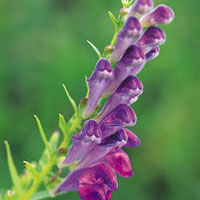Chinese Scullcap
 © Martin Wall
© Martin WallParts Used & Where Grown
Scutellaria baicalensis, a mint family member, is grown in China and Russia. The root of this plant is used in traditional Chinese herbal medicines and has been the focus of most scientific studies on scullcap. American scullcap and Chinese scullcap are not interchangeable.
- Reliable and relatively consistent scientific data showing a substantial health benefit.
- Contradictory, insufficient, or preliminary studies suggesting a health benefit or minimal health benefit.
- For an herb, supported by traditional use but minimal or no scientific evidence. For a supplement, little scientific support.
Our proprietary “Star-Rating” system was developed to help you easily understand the amount of scientific support behind each supplement in relation to a specific health condition. While there is no way to predict whether a vitamin, mineral, or herb will successfully treat or prevent associated health conditions, our unique ratings tell you how well these supplements are understood by the medical community, and whether studies have found them to be effective for other people.
For over a decade, our team has combed through thousands of research articles published in reputable journals. To help you make educated decisions, and to better understand controversial or confusing supplements, our medical experts have digested the science into these three easy-to-follow ratings. We hope this provides you with a helpful resource to make informed decisions towards your health and well-being.
This supplement has been used in connection with the following health conditions:
| Used for | Amount | Why |
|---|---|---|
Epilepsy (Asian Ginseng, Bupleurum, Cassia Bark, Ginger, Jujube, Licorice, Peony, Pinellia) | 2.5 grams a day of sho-saiko-to or saiko-keishi-to in tea or capsules | The Chinese herb bupleurum is included in two herbal formulas, sho-saiko-to and saiko-keishi-to. Both have been shown to be helpful for epilepsy. |
Hepatitis (Asian Ginseng, Bupleurum, Cassia Bark, Ginger, Jujube, Licorice, Peony, Pinellia) | Take 2.5 grams of sho-saiko-to three times per day | Trials have shown that the bupleurum-containing formula sho-saiko-to can help reduce symptoms and blood liver enzyme levels in people with chronic active viral hepatitis. |
Liver Cirrhosis (Asian Ginseng, Bupleurum, Cassia Bark, Ginger, Jujube, Licorice, Peony, Pinellia) | 2.5 grams of the Chinese herbal formula sho-saiko-to three times daily | The Chinese herb bupleurum is a component of the formula sho-saiko-to, which was shown in one preliminary trial to liver cancer risk in people with liver cirrhosis. |
Bronchitis | Refer to label instructions | Chinese scullcap might be useful for bronchitis as an anti-inflammatory. |
Hepatitis | Refer to label instructions | Chinese skullcap may be useful for liver infections. |
HIV and AIDS Support (Asian Ginseng, Bupleurum, Cassia Bark, Ginger, Jujube, Licorice, Peony, Pinellia) | Refer to label instructions | The herbal formula sho-saiko-to has been shown to have beneficial immune effects on white blood cells in people infected with HIV. |
Traditional Use (May Not Be Supported by Scientific Studies)
Chinese scullcap is typically used in herbal combinations in Traditional Chinese Medicine to treat inflammatory skin conditions, allergies, high cholesterol and triglycerides.1
Copyright © 2026 TraceGains, Inc. All rights reserved.
Learn more about TraceGains, the company.
The information presented by TraceGains is for informational purposes only. It is based on scientific studies (human, animal, or in vitro), clinical experience, or traditional usage as cited in each article. The results reported may not necessarily occur in all individuals. Self-treatment is not recommended for life-threatening conditions that require medical treatment under a doctor's care. For many of the conditions discussed, treatment with prescription or over the counter medication is also available. Consult your doctor, practitioner, and/or pharmacist for any health problem and before using any supplements or before making any changes in prescribed medications. Information expires December 2026.
